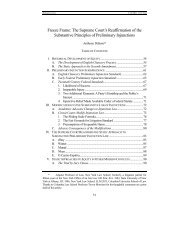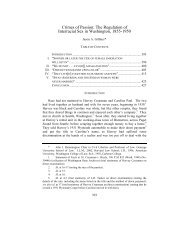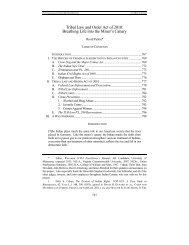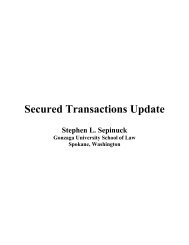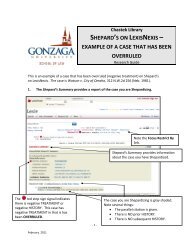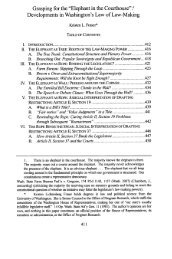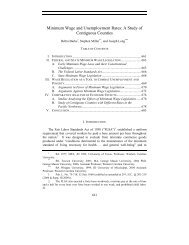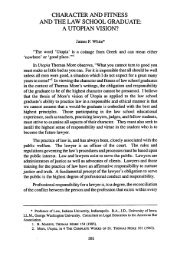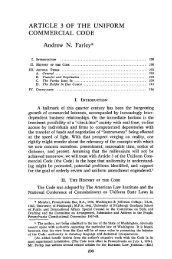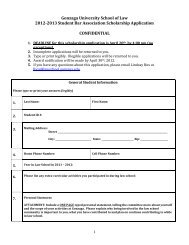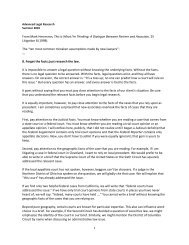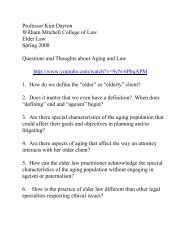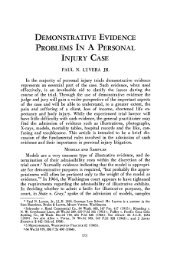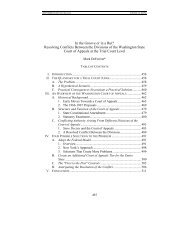professional responsibility, student practice, and the clinical
professional responsibility, student practice, and the clinical
professional responsibility, student practice, and the clinical
Create successful ePaper yourself
Turn your PDF publications into a flip-book with our unique Google optimized e-Paper software.
1990/91]<br />
STUDENT PRACTICE<br />
Rules of Professional Conduct. 3 4 The rule also states that legal interns<br />
"shall be subject to <strong>the</strong> Rules of Professional Conduct... <strong>and</strong> shall be<br />
personally responsible for all services performed as an intern. 35<br />
What, <strong>the</strong>n, do <strong>the</strong> Rules of Professional Conduct tell us about <strong>the</strong><br />
ethical duties of <strong>student</strong> interns <strong>and</strong> <strong>the</strong>ir supervisors? RPC 1.1 refers to an<br />
obligation of competent representation. It states: "A lawyer shall provide<br />
competent representation to a client. Competent representation requires <strong>the</strong><br />
legal knowledge, skill, thoroughness <strong>and</strong> preparation reasonably necessary for<br />
<strong>the</strong> representation. 36<br />
RPC 5.3 addresses responsibilities regarding non-lawyer assistants:<br />
With respect to a nonlawyer employed or retained by or associated with<br />
a lawyer:<br />
(a) A partner in a law firm shall make reasonable efforts to ensure that <strong>the</strong><br />
firm has in effect measures giving reasonable assurance that <strong>the</strong> person's<br />
conduct is compatible with <strong>the</strong> <strong>professional</strong> obligations of <strong>the</strong> lawyer;<br />
(b) A lawyer having direct supervisory authority over <strong>the</strong> nonlawyer shall<br />
make reasonable efforts to ensure that <strong>the</strong> person's conduct is compatible<br />
with <strong>the</strong> <strong>professional</strong> obligations of <strong>the</strong> lawyer; <strong>and</strong><br />
(c) A lawyer shall be responsible for conduct of such a person that would<br />
be a violation of <strong>the</strong> Rules of Professional Conduct if engaged in by a<br />
lawyer if:<br />
(1) The lawyer orders or, with <strong>the</strong> knowledge of <strong>the</strong> specific conduct,<br />
ratifies <strong>the</strong> conduct involved; or<br />
(2) The lawyer is a partner in <strong>the</strong> law firm in which <strong>the</strong> person is<br />
employed, or has direct supervisory authority over <strong>the</strong> person, <strong>and</strong> knows<br />
of <strong>the</strong> conduct at a time when its consequences can be avoided or<br />
mitigated but fails to take reasonable remedial action. 37<br />
34. Id. at Rule 9(a)(4).<br />
35. Id. at Rule 9(c).<br />
36. This rule follows <strong>the</strong> language of <strong>the</strong> ABA Model Rules of Professional Conduct.<br />
DR 6-101(A)(2) of <strong>the</strong> ABA Model Code of Professional Responsibility required<br />
"preparation adequate in <strong>the</strong> circumstances," whereas DR 6-101(A)(3) prohibited <strong>the</strong><br />
"neglect of a legal matter." See MODEL CODE OF PROFESSIONAL RESPONSIBILITY DR 6-<br />
101(A)(2); DR 6-101(A)(3) (1983). ABA Model Rule 1.1 affirmatively requires <strong>the</strong> lawyer<br />
to be competent. MODEL RULES OF PROFESSIONAL CONDUCT Rule 1.1 (1990).<br />
37. The Washington rule' follows ABA Model Rule 5.3. There was no direct



